Tag archives: US politics
The May 2017 issue of Physics World is now out
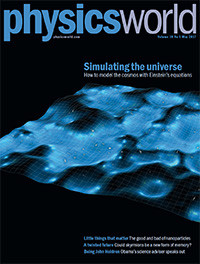 By Matin Durrani
By Matin Durrani
Einstein’s equations of general relativity might fit on a physicist’s coffee mug, but solving them is no mean feat. Now, however, the equations have been solved in a cosmological setting for the first time, as Tom Giblin, James Mertens and Glenn Starkman explain in the May 2017 issue of Physics World magazine, which is now live in the Physics World app for mobile and desktop
Elsewhere in the issue, you can enjoy an interview with John Holdren, who spent eight years as Barack Obama’s presidential science adviser. Find out too about the good and bad of nanoparticles and explore the potential that skyrmions – magnetic quasiparticles – could hold as a new form of memory storage.
Don’t miss either this month’s Lateral Thoughts, in which physicist Roger Todd describes how his invention of a system for automatically watering his house plants almost led to a commercial device.
Remember that if you are a member of the Institute of Physics, you can read Physics World magazine every month via our digital apps for iOS, Android and Web browsers.
View all posts by this author | View this author's profile
Eye-catching signs from March for Science Bristol
By James Dacey
On Saturday, there were almost 600 sister events across the globe in support of the March for Science gathering in Washington, DC. One such event occurred in Bristol, UK, where Physics World magazine is produced, which featured a march and speeches from science communicators. I popped along to the event with my camera and here are some of the most eye-catching signs from the day.
View all posts by this author | View this author's profile
From blue fogs to Brexit – the April 2017 issue of Physics World is now out
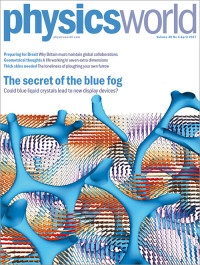 By Matin Durrani
By Matin Durrani
“The secret of the blue fog” might sound like a Tintin book, but it’s all about a strange form of liquid crystal that’s the cover story in the April 2017 issue of Physics World magazine, which is now live in the Physics World app for mobile and desktop.
First observed in the late 1800s, only recently have we finally uncovered the structure of these materials, which turn blue when cooled. As Oliver Henrich and Davide Marenduzzo explain, blue liquid crystals could be used for new kinds of display devices.
Elsewhere in the issue, mathematical physicist Jason Lotay explains his work in seven extra dimensions, while science writer Benjamin Skuse examines the challenge for respected physicists with theories outside the mainstream.
Don’t miss either our latest look at Donald Trump’s scientific shenanigans, including an interview with Rush Holt – the physicist-turned-politician who’s now head of the American Association for the Advancement of Science.
Remember that if you are a member of the Institute of Physics, you can read Physics World magazine every month via our digital apps for iOS, Android and desktop.
View all posts by this author | View this author's profile
Science supporters protest in Boston
By Matin Durrani in Boston, US
Hundreds of scientists and science supporters gathered in Copley Square in Boston earlier today in a rally to underline the importance of science. The “Stand up for Science” event was organized to coincide with the annual meeting of the American Association for the Advancement of Science, which is taking place a few blocks away.
To find out more about the aims and purpose of the rally, I hooked up with Geoffrey Supran (picutred below), who helped to organize the event. Having originally studied physics at the University of Cambridgein the UK, Supran obtained a PhD in materials science at the Massachussetts Institute of Technology and is now doing a postdoc in the history of science with Naomi Oreskes at nearby Harvard University.
AAAS chief predicts “tough and uncertain times” for US science funding
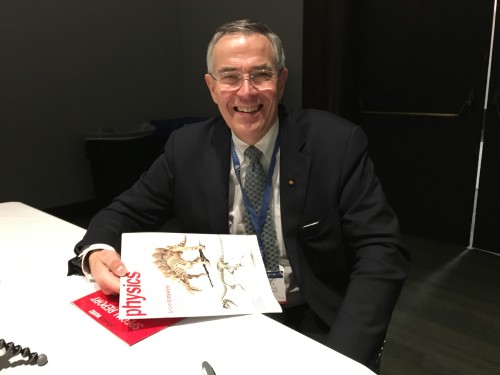
Not for me – president of the American Association for the Advancement of Science Rush Holt says there’s “no chance” of him becoming Donald Trump’s science adviser but admits it would be hard to turn down if offered.
By Matin Durrani in Boston, US
Rush Holt is that rarity: a physicist who’s also been a politician, having spent 16 years as Democratic Congressman for New Jersey’s 12th congressional district from 1999 to 2015. Those two attributes make him well placed in his current role as president of the American Association for the Advancement of Science (AAAS), which is holding its annual meeting here in Boston.
So when I sat down with Holt yesterday, our conversation naturally focused on the impact on science of Donald Trump’s election as US president. The bouffant-haired, former businessman and reality-TV star may have so far said little about the subject, but Holt believes that “tough and uncertain times” lie ahead for scientific funding. “I think we will be on a very austere budget for all non-defence discretionary activity,” he warns.
View all posts by this author | View this author's profile
US policy chiefs explain how to handle Trump
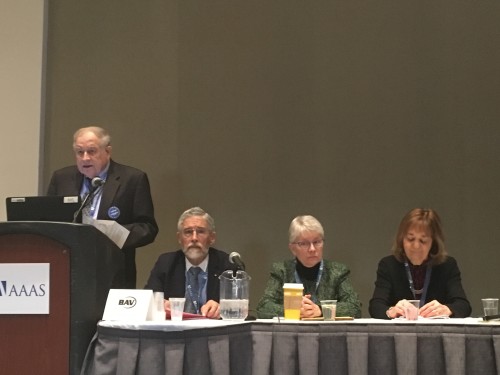
Speaking out – Neal Lane introduces John Holdren (left), Kerri-Ann Jones (centre) and Rosina Bierbaum at the 2017 meeting of the American Association for the Advancement of Science in Boston.
By Matin Durrani in Boston, US
I’m here at the 2017 meeting of the American Assocation for the Advancement of Science in Boston, where the theme is “Serving society through science policy”. The focus was picked last year, but it turned out to be an auspicious choice with the election of Donald Trump throwing the science community into uncharted policy waters.
Trying to make sense of what life will be like for US scientists under the Trump administration were five people with extensive experience of working closely with recent US presidents.
Chairing the session was Neal Lane, who served as Bill Clinton’s presidential science adviser for two years in the 1990s. Also present was physicist John Holdren, who spent eight years until last month as Barack Obama’s science chief, for which the audience gave him a generous round of applause.
3D neutrinos on your phone, Hamiltonian: an Irish Musical, is a March for Science a good idea?
By Hamish Johnston
How would you like to explore a giant neutrino detector in 3D from the comfort of your mobile phone? VENu is a new smartphone app that allows you explore the physics underlying the MicroBooNE neutrino detector at Fermilab. Developed by Alistair McLean of New Mexico State University and an international team of physicists, the app is used in conjunction with the Google Cardboard headset to provide users with a virtual-reality experience of MicroBooNE. VENu includes games that offer “brain teasing challenges” including working out how to spot a neutrino event in a busy background of cosmic-ray events. The app can be downloaded free of charge from the Apple Store and the Google Android Marketplace.
View all posts by this author | View this author's profile
Physics in the US: no longer business as usual
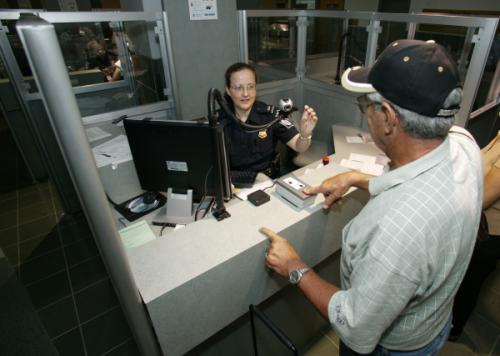
New rules: citizens of seven countries have been barred from the US. (Courtesy: CBP)
By Matin Durrani
Over the last couple of years here at Physics World, we’ve been publishing special reports examining the state of physics in different nations around the world, including Brazil, China, Japan, India, Korea and Mexico.
When we decided in September last year to publish our next special report in 2017 on the US, it seemed reasonable to expect that Hillary Clinton was going to be elected president. For science, a Clinton presidency would pretty much have been “business as usual” and so, probably, would have been the tone of our special report.
But now that Donald Trump is in the White House, it looks as if we’re entering a period where the US is as far removed from “business as usual” as you could imagine.
View all posts by this author | View this author's profile
American angst

Danger ahead – Donald Trump’s election as US president will not be business as usual for science policy. (Courtesy: iStock/uschools)
By Matin Durrani
Like many people, I’m fearful of the imminent Donald Trump presidency, given the many sexist, racist and otherwise unpleasant remarks he made during the US election campaign. However, his slogan – “Make America great again” – proved powerfully effective for many voters. Who, after all, could disagree with renewed domestic glory? Sadly, Trump’s plans for achieving that goal – what little we know of them – are based on such ill-informed and ignorant views that he could damage America’s long-standing leadership in many areas, including science.
View all posts by this author | View this author's profile
Robots at arXiv, physicist runs for US president, Einstein emojis galore
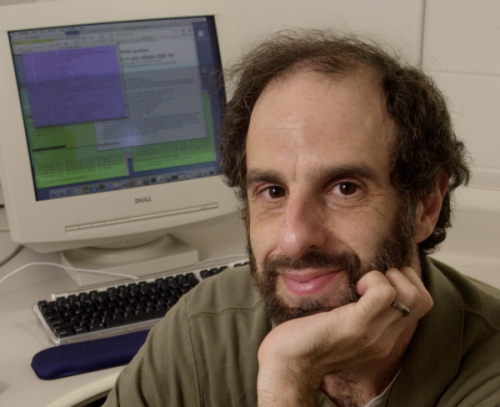
Preprint pioneer: Paul Ginsparg in 2002, long before arXiv received 10,000 papers per month. (Courtesy: MacArthur Foundation)
By Hamish Johnston
Last month the arXiv preprint server received more than 10,000 papers – the first time in the history of the physics paper depository. While arXiv papers are not peer reviewed, they are checked to ensure that they are “of interest, relevance and value” to the scientific community – which arXiv promises to do within 24 h of submission. So how do they do it? Surely someone doesn’t read every word of every paper? The answer can be found in “What counts as science?”, which appears in Nautilus. arXiv was set up in 1991 by the physicist Paul Ginsparg, who explains how the service uses machine learning to sort the wheat from the chaff – something that has attracted controversy.
View all posts by this author | View this author's profile

